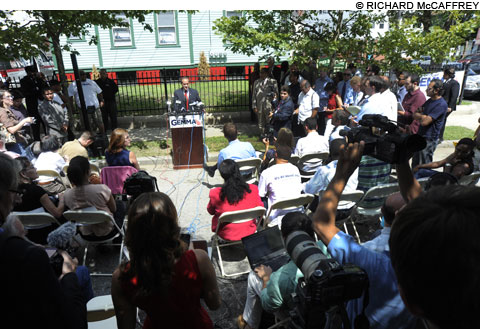
THE STAGE Gemma before a skeptical press corps. |
In the run-up to Congressional candidate Anthony Gemma's highly anticipated press conference this week, unveiling allegations of voter fraud by incumbent Congressman David Cicilline, the chattering class — this observer included — was pretty much unanimous: Gemma had to deliver the goods or he was finished.
But as I write, just minutes after the event — and just minutes before the Phoenix's deadline — something more complicated, and more interesting, is taking shape: a remarkable case study in Rhode Island's strange relationship with the truth.
Gemma arrived at the event, staged at his Providence offices on Broad Street, with a reputation for the grandiose. In April, he'd teased the official launch of his campaign with the promise of "a major announcement" that would "positively impact the political, economic, and cultural fates of Rhode Island and, by extension, the United States of America for the foreseeable future."
After said announcement, a gaggle of reporters eager to quiz him on the imminent Renaissance was rebuffed — Gemma fleeing to his SUV, while his supporters gobbled up a tower of brightly colored cupcakes.
The press corps, since then, has rolled its eyes more than once at the businessman-turned-Democratic candidate. And when he suggested that this week's event would have "an immediate, stunning, game-changing impact on Rhode Island politics," it was almost too much.
The press conference was packed, colorful, and often surreal. Gemma, at one point, suggested that a top legislator in the state's House of Representatives had cross-dressed in order to cast a fraudulent vote.
But at the heart of Gemma's presentation was a recitation of what he called sworn statements by Rhode Islanders who had seen Cicilline's top operatives commissioning voter fraud: paying people for votes, sending teens into polling places to impersonate voters, registering supporters at addresses that turned out to be vacant lots.
Gemma declined to provide any names, though, saying he was protecting the identities of those who made the statements — and the integrity of ongoing criminal investigations.
The media, primed to pounce, quickly took Gemma to task. How can any of this be verified? reporters asked. How can these accusations be considered credible — or responsible?
Legitimate questions, all.
But Gemma's performance was not as bad as initial media reports would have you believe. He was solemn. He said the right things about the sanctity of the vote. And here in Rogue Island, his accusations — whether true or utter garbage — probably seem plausible to the average voter.
Cicilline's reputation for dishonesty — the former Providence mayor claimed the city was in "excellent" fiscal condition during his 2010 race for Congress — only makes the claims more believable.
In the hours and days after I write, we may learn more about the veracity of Gemma's claims — and their ultimate impact on the race.
But for now, we're left in a funny place. Gemma, at first blush, doesn't seem to have destroyed Cicilline's career. And he doesn't seem to have destroyed his own, either. Instead, we are left in a murky swirl of snickering and accusation and manipulation, as is often the case in Rhode Island.
And it somehow seems appropriate that Gemma — carnival barker? truth-teller? cosmic joke? — has led us there.